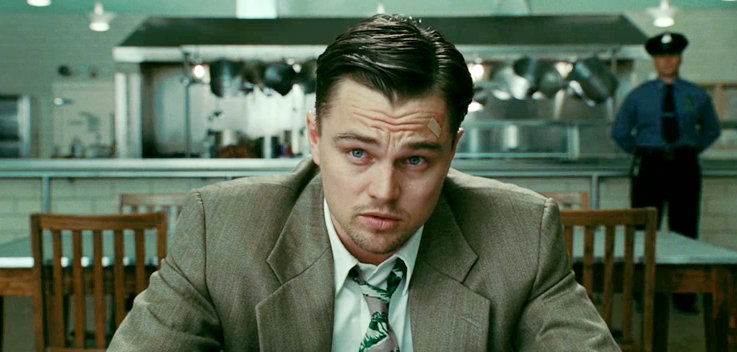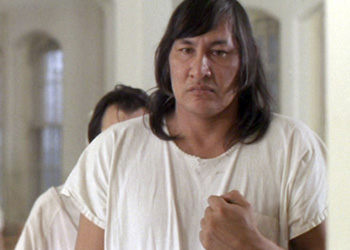Just when I thought I had finally escaped The Namesake it came crashing back into my life. I was watching Superman Returns when suddenly up popped Gogol on the screen! Actually it was Kal Penn playing one of Lex Luther's henchmen, but the film adaptation of The Namesake made such an impression on me that Kal and Gogol are forever linked in my mind. I might have been able to let this go, except Kal/Gogol was using some kind of rocket launcher to shoot kryptonite encased crystals into the ocean as part of Lex Luther's evil plot. This certainly was not Gogol-like behavior, but it also didn't seem to suit Kal, it just seemed wrong. This is because I think Kal Penn has a funny face, by that I don't mean there is anything wrong with his face, just that he looks like he should be telling jokes or getting into comic mischief, rather than executing a plot for world domination. Both times I have seen him in a serious role it has made me uneasy, he didn't suit Gogol and he just didn't seem like the evil minion type either. This sense of discord between my perception of him, and his actual roles motivated me to do some research to try to sort out this upsetting incongruity. It turns out he is actually a fairly serious guy, he has certainly played many comedic roles as an actor but he also has some serious characters under his belt. The one we are all most familiar with is, of course, Gogol. Penn, whose real name is Kalpen Modi, is pretty well educated. He double majored in film and sociology at UCLA and is pursuing a certificate in international security from Stanford. He was also invited by the University of Pennsylvania to lecture in the Asian American Studies Department. I can't imagine what it would be like to attend a lecture by Gogol, probably even more bewildering than the whole rocket launcher incident. Penn also has a lifelong interest in politics, inspired by his grandparents' participation in Gandhi’s march for Indian independence. Penn has recently explored this interest in his role as Associate Director of the White House Office of Public Engagement for President Obama. I was a little disturbed to read that he briefly left this post in order to film A Very Harold and Kumar Christmas 3D, but that he has now been reinstated in what seems to be a fairly important political position. I am sure Kal is very competent, but that title might give people the wrong idea. Although really, I am not sure what the "right idea" is when it comes to Kal Penn. He is a politician, he gives academic lectures, is funny, helps super villains take over the world, and struggles through his angsty teenage years with a mop of long greasy hair. I really do not know what to think of him, and although it is a stretch to compare this to schizophrenia, I think I may have gotten a small taste of what it would be like not to know what is reality and what is your own skewed perception.
 |
| Politician Kal |
 |
| Funny Kal |
 |
| Angsty Teenage Kal |
 |
| Serious Kal |
 |
| World Domination Kal |

 Not to be melodramatic, but our recent reading material is worrying me a little bit. Faced with a lack of data sheets, my AP English paranoia and dismay has refocused on literary themes, and I am coming to some disturbing conclusions. First, we encountered a weepy and depressed grandmother who sees sadness in everything. Then, we were set loose on the internet to learn about Mr. McEwan, a man known affectionately as "Ian Macabre" who said himself that he "hate[s] comic novels." Tied into McEwan and Amsterdam is "Crossroads", which opens with the uplifting first lines "Two friends who met here and embraced are gone, / Each to his own mistake." Amsterdam itself opens outside a crematorium after a woman's sudden and unexpected death. Of course sadness, mistakes, and death are all a part of life and should be reflected in literature, but these themes have occurred with alarming frequency over the past couple of weeks. I am left wondering, am I in for a month of depressing literature? Or will further reading of Amsterdam and deeper analysis of "Crossroads" pleasantly surprise me?
Not to be melodramatic, but our recent reading material is worrying me a little bit. Faced with a lack of data sheets, my AP English paranoia and dismay has refocused on literary themes, and I am coming to some disturbing conclusions. First, we encountered a weepy and depressed grandmother who sees sadness in everything. Then, we were set loose on the internet to learn about Mr. McEwan, a man known affectionately as "Ian Macabre" who said himself that he "hate[s] comic novels." Tied into McEwan and Amsterdam is "Crossroads", which opens with the uplifting first lines "Two friends who met here and embraced are gone, / Each to his own mistake." Amsterdam itself opens outside a crematorium after a woman's sudden and unexpected death. Of course sadness, mistakes, and death are all a part of life and should be reflected in literature, but these themes have occurred with alarming frequency over the past couple of weeks. I am left wondering, am I in for a month of depressing literature? Or will further reading of Amsterdam and deeper analysis of "Crossroads" pleasantly surprise me?






